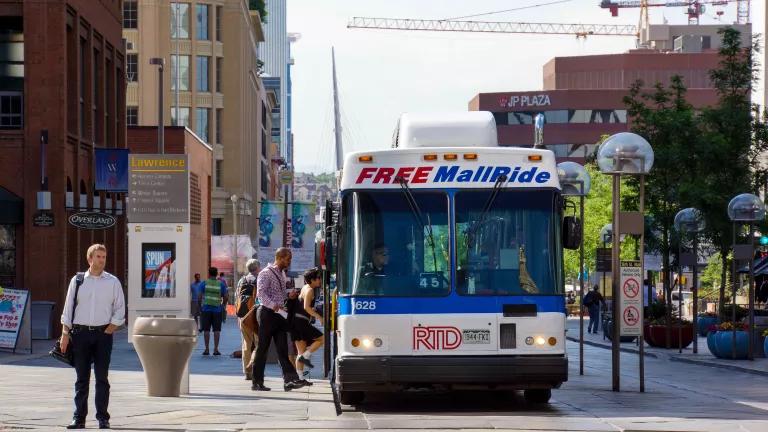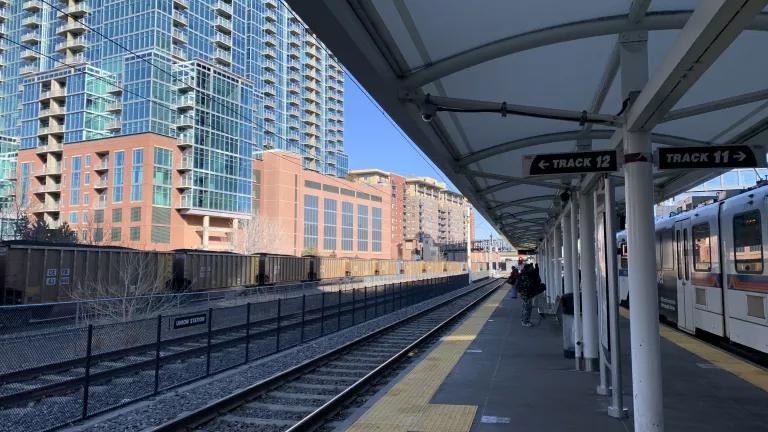Colorado: A National Leader in Transportation and Climate
New analysis shows Colorado’s remarkable clean transportation progress—and a need for greater transit investment

RTD Free Mall Ride
Kevin Zolkiewicz via Flickr, CC BY-NC 2.0 DEED
Colorado ranks seventh in the nation in its progress toward aligning transportation policy and spending with state and national climate goals, according to a new NRDC analysis. The Rocky Mountain state has advanced policies that prioritize investments in affordable, clean mobility choices like public transit, walking, and biking; supported the transition to zero-emissions vehicles by rapidly deploying vehicle charging infrastructure throughout the state; and adopted several impactful environmentally-conscious and equitable procurement practices.
This state transportation scorecard evaluates transportation policy and spending in all 50 states to understand how federal funding from the bipartisan infrastructure law and the Inflation Reduction Act are likely to influence the clean transportation landscape.
The record levels of transportation funding from these infrastructure and climate laws provide states with a unique opportunity to make generational progress toward a clean and equitable transportation system—but whether we see that progress depends on states’ willingness to lead. As previous analysis from the Georgetown Climate Center has showed, states’ spending choices could in fact increase climate pollution if states are not careful to prioritize clean transportation investments.
In the report’s analysis, states are scored across 20 metrics related to state planning for climate and equity, vehicle electrification, expanding transportation choices, system maintenance, and procurement. The resultant ranking shows the State’s nationally recognized leadership, with Colorado scoring 56.9 points out of 100, in between New York (ranked 6th) and New Jersey (8th) and ahead of each of its neighboring states, with New Mexico the next highest-scoring among them in 15th place.
Pioneering policies like Colorado’s Greenhouse Gas Pollution Standard for transportation have already helped the state shift funding away from costly, ineffective, and polluting highway expansions and toward high-quality, low-carbon mobility choices. Colorado also scores highly relative to its peers for its progress installing both “Level 2” and fast-charging electric vehicle charging ports, identifying a target to reduce driving (and therefore traffic) throughout the state, and prioritizing investments in repair and maintenance using federal funds. Colorado is also the only state out of 50 to score the full allotment of points for the clean and equitable procurement practices considered in the report.
Colorado has continued to lead in recent months
The scorecard’s analysis period closed in February 2023, meaning that any actions taken since then are not reflected in the state’s score—which means that Colorado is not yet getting credit for its continued leadership. Colorado adopted the Advanced Clean Trucks rule in April, followed just last month with the adoption of Advanced Clean Cars II. Further, Colorado did not get credit for an existing “Vehicle Exchange Program” supporting low-income zero-emissions vehicle buyers, for which implementation began after the study period. If Colorado had been eligible for these points, it could have been awarded up to an additional 14 points under the report’s scoring rubric.
More transit investments necessary to grow Colorado’s clean transportation leadership
One gap in Colorado’s score highlights a critical area of focus for elected leaders in Colorado—a lack of state and federal funding allocated to improve public transit service during the report’s three-year study period (2018-2020) for these funds. While Colorado has funded innovative transit programs like its interregional “Bustang” service (since 2015) and a youth and summertime fare-free transit campaign starting in 2022, Colorado is the only state in the top 10 to score zero points in the "state funding for public transit" category according to the report’s scoring criteria. Colorado is also tied for the lowest score (1.2 out of 10 possible points) among the top 10 in terms of the fraction of federal transportation funds invested in sidewalks, public transit, or safe bicycling infrastructure—a category where neighboring New Mexico scores 4.1 out of 10, for example.
The Colorado Department of Transportation (CDOT) has repeatedly demonstrated its commitment to supporting transit under current state and agency leadership, with Executive Director Shoshana Lew joining leaders from various local and regional partner agencies in the state capital today (November 8, 2023) to kick off CDOT’s Bus Rapid Transit Program for the Denver region. With this committed leadership and implementation capacity in place, accelerated transit investments should be a federal, state, and local transportation funding priority and would strongly support Governor Polis’ recent emphasis on housing and land use reforms. Aligning location-efficient housing incentives with improved transit service will ensure that the State’s continued growth gives Coloradans access to both affordable housing and clean, affordable transportation choices.
State leaders will continue to play a critical role in enabling, administering, and fully leveraging funding sources at all levels of government to advance Colorado’s clean air, equity, affordability, and safety goals—and policies to support and grow investment in public transit should be a top priority.




